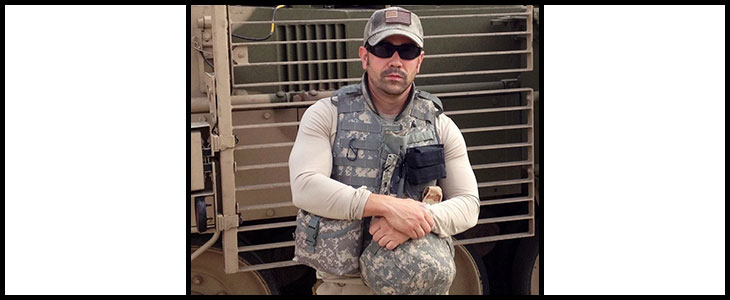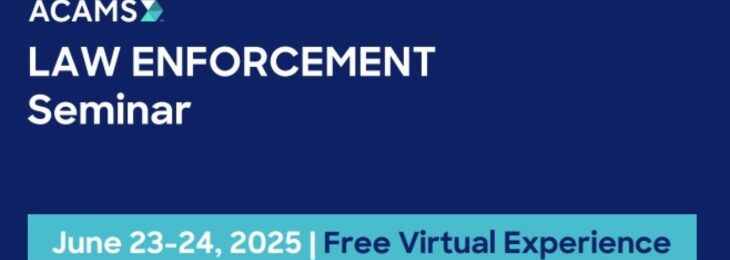
ACAMS Today had the opportunity to speak with Henry “Hank” Hernandez, U.S. senior business manager for Global Payment Solutions at HSBC, about his experience as a U.S. veteran, his work with counterterrorism and intelligence analysis and what he sees as the most important transferrable skill from military service to the anti-financial crimes (AFC) industry.
Prior to joining HSBC, Hernandez worked for the Defense Intelligence Agency as a senior intelligence officer, where he led a team of 20 military and civilian intelligence analysts. The team was responsible for producing complex strategic, operational and tactical studies on a full range of Latin America-based security issues, including drug trafficking and transnational organized crime.
In addition, Hernandez has authored various intelligence studies for the U.S. government on counter drug-related issues. His studies enhanced the intelligence community and the U.S. government’s understanding of potential threats and challenges relating to narcotics trafficking, money laundering/threat finance, weapons smuggling and piracy/counterfeiting trends.
Earlier in his career, Hernandez served as a military intelligence officer for the U.S. Army and U.S. Army Reserve. His teams were responsible for producing analytic and intelligence products to support U.S. military forces, researching targets of interests to develop vetted intelligence products in support of military operations. Hernandez and his teams successfully identified, monitored and reported on terrorism trends, alerting decision makers of new or emerging threats to allied interests.
Hernandez is active in the HSBC Veteran’s Employee Resource Group and currently serves as their national chair. In this role, he oversees, coordinates and leads volunteer activities for over 500 employees while helping to provide a forum for employees to discuss issues faced by veterans while enhancing veteran retention to meet the present and future needs of HSBC.
As an Employee Resource Group leader, Hernandez consults with various leadership teams: U.S. Executive Committee, Employee Resource Group Advisory Board members, etc. Engaged in implementing enterprise change to help drive diversity and inclusion goals and programs, Hernandez has partnered with Veterans on Wall Street (VOWS), the Bob Woodruff Foundation (BWF) and American Corporate Partners, to forge strategic initiatives to enhance the lives and employment opportunities of active and transitioning military service members. Moreover, Hernandez has collaborated in HSBC’s Early Careers and Diversity recruiting, to identify opportunities for valor to be taken into account in the recruiting process, as well as retaining and promoting a diverse workforce via strategic alliances with student veteran groups at local universities.
ACAMS Today (AT): First, I would like to thank you for your service. It is an honor to speak with you on Veterans Day. Could you share your experience in the armed forces and what your duties or specialty was while in the military?
Hank Hernandez (HH): Thank you, the honor is all mine. I really appreciate ACAMS Today featuring a veteran and allowing me the opportunity to share my transition story and views. My experience in the Army was life-changing. Growing up the son of Cuban immigrants with modest means, my prospects were somewhat limited. The Army represented a chance to change my trajectory in life, and in many ways, repay the debt I felt to the United States for providing my parents refuge from communism. The Army opened a world of opportunities, life learning, formal education, fascinating experiences and travel. I was a signals intelligence officer and much of what I did is classified, but speaking broadly, I had the opportunity to work at both the strategic and tactical levels over the years, from supporting geopolitical missions in foreign lands to counterterrorism and threat finance analysis in the Middle East and Latin America. The Army changed my life in ways that I could never have imagined when I raised my right hand to swear in. It was an honor to serve.
AT: You had quite a bit of experience in counterterrorism. What do you see as the biggest challenge for AFC professionals in the current climate? Also, do you have any advice on what financial institutions (FIs) should focus on to identify and monitor any emerging terrorist threats?
HH: The biggest challenge has always been and remains the unknowns, perhaps now more than ever with the rapid pace of evolving technologies and ways to obfuscate financial activity and support to terrorist groups/fighters. With that in mind, traditional nonbanking services have for years been a popular funding path for terrorist groups. This includes leveraging financial technology services to obtain, send, mask and use funds in ways that largely circumvent traditional FIs. As we all know, cryptocurrencies offer anonymity, decentralization and globalization, making it appealing for bad folks and a challenge for AFC professionals to tackle. Moreover, the irreversibility of cryptocurrency transactions and low transaction costs make them a popular choice of terrorist funding and a legitimate challenge we face. I think it’s important for AFC professionals to stay informed, connected and invested in new technologies that will help close existing gaps and help provide actionable and credible intelligence to better uncover those money trails and links exploited by terrorist groups using these technologies. We also can’t discount the pervasive use of fundraising via social media as a significant threat. Social networks are commonly used to coordinate fundraising campaigns with well-organized outreach efforts to large audiences using chats and forums on all the popular sites. Money is raised, moved and used to fund groups through various methods, exacerbating the challenge.
AT: You have authored various studies on counter drug-related issues. What three recommendations would you give AFC professionals on how to identify drug-related proceeds?
HH: It comes down to sticking to the basics. Firstly, staying informed is key because typologies and indicators tend to change over time as criminal organizations evolve in line with technologies. I recommend staying informed via industry associations, such as ACAMS, on emerging typologies. Secondly, I think it’s crucial that AFC professionals stay aware of the latest Financial Crimes Enforcement Network advisories on drug and human trafficking, which provide helpful insight into what law enforcement is collectively seeing in terms of trends. Finally, stay curious and always think critically. Do the transactions make sense? Are we checking for the use of shell companies, front companies, nominees or other means to conceal the true beneficial owners? Use the tools available to you. Are we leveraging 314(b)s sufficiently to follow the money trail and understand the nature of the transactions? Are we using requests for information (RFIs) to understand our customers and their transactions?
AT: In your opinion, what is the most transferrable skill from veterans to the AFC industry?
HH: There are many transferrable skills: Discipline and resiliency to learn and master a new craft; social and cultural awareness that allows us to communicate on meaningful levels and develop strong networks; and decision-making and resourcefulness that enables veterans to navigate through challenges with conviction and decisiveness. Perhaps for me, the single most transferrable skill is adaptability. In the military you need to learn quickly and take on new responsibilities/jobs/missions. So, the ability to adapt, change and overcome are critical skills to success. In the military, you must be OK with change and expanding beyond your comfort zone. Adaptability has helped me reinvent myself from military service to working with a three-letter agency to banking—and I’m still reinventing myself. I joined HSBC in 2015 via the firm’s financial intelligence unit and then managed investigations teams, served in an external liaison role for Financial Crime, worked on the divestiture of retail operations, and now, I work in business management, where I’m expanding my understanding and knowledge of the bank’s operations. In the long run, it will help me be a better AFC professional when I return to the AFC field where I have a strong passion and interest. There’s not a lot of AFC professionals with my background in analysis, financial crime and business operations in the payment space, which I believe makes me well-rounded.
AT: What should employers be aware of to enhance veteran retention within FIs?
HH: The mission, the people and the values are important to veterans. We joined the military because we wanted to be part of something greater than our individual selves. That mindset doesn’t change because we enter corporate America. It’s important for employers to have purpose, belonging through affinity groups, community and trust. Also, providing veterans with the space to learn their new craft while trusting them to get the mission done is critical. When hiring, it’s important to mention that even if the skills and background are not a perfect fit for the role, an employer should consider that a veteran candidate can adapt and learn quickly—a skill developed in the military. You might be surprised by how great a candidate can become in a short period of time.
AT: What were the key factors for you when transitioning to civilian life?
HH: I would say confidence and vision. The confidence to bet on myself when I knew it was time to separate, and the vison to prepare through calculated risks on career choices. The key is knowing what you want to do and then having the confidence to achieve it.
AT: When you are off the clock, what do you enjoy doing?
HH: I’m a gym rat, sports enthusiast and avid learner. I love working out. Most of my days begin with a workout. That’s my first opportunity of the day to succeed. It sets me on a productive path for the rest of the day. As I mentioned, I love sports, particularly my New York Yankees. Feeding the mind and body with a sprinkle of Yankees fanaticism. Finally, I enjoy reading and listening to different podcasts on economic, business and political topics.
Interviewed by: Karla Monterrosa-Yancey, CAMS, editor-in-chief, ACAMS, editor@acams.org












